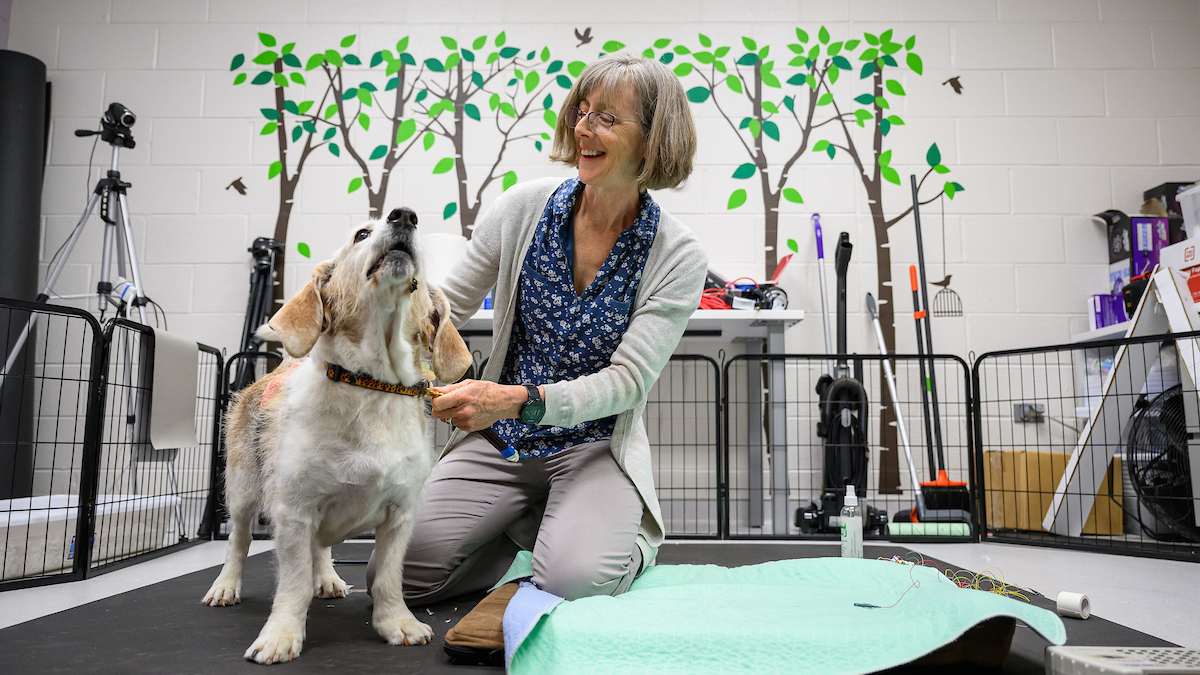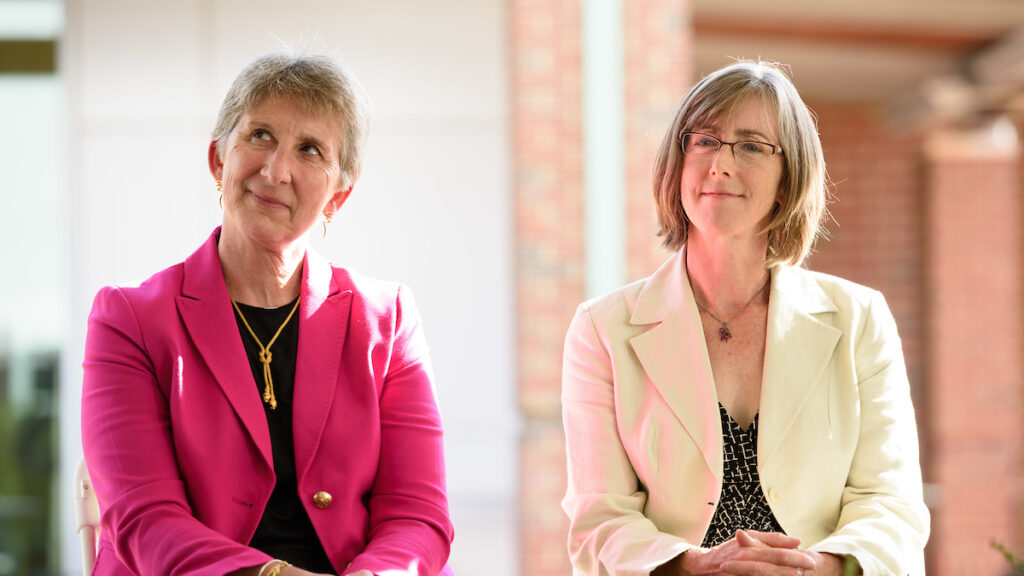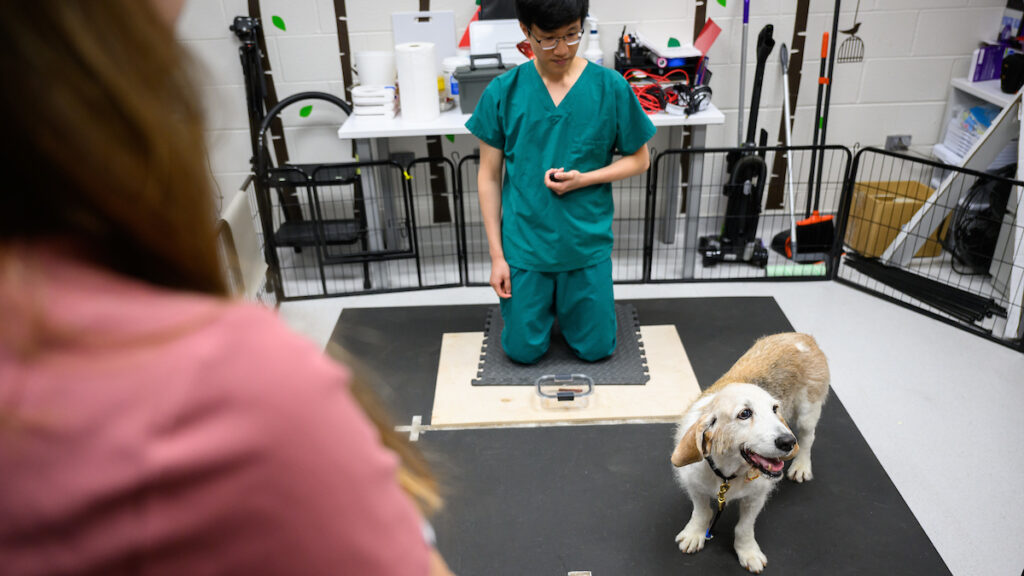Next Step for NC State’s Pioneering Geroscience Research: A Center for Healthy Aging
Dr. Natasha Olby, a world-renowned researcher in the aging of the canine nervous system, will lead the collaborative center that aims to deepen research on how dogs age while bettering medicine’s understanding of human aging.

Building on its world-renowned leadership in researching the aging process, the NC State College of Veterinary Medicine is establishing a Center for Healthy Aging led by Dr. Natasha Olby, the Dr. Kady M. Gjessing and Rahna M. Davidson Distinguished Chair in Gerontology.
The center will bring NC State faculty members from multiple disciplines under the same umbrella to collaborate on four missions: innovative research, cutting-edge education, excellence in clinical practice and support for pet owners. Olby anticipates that the geroscience research will be translatable to human medicine and help us better understand aging in people.
“As we continue to break new ground in geriatric medicine, I realized the people I work with across the school are all passionate about aging as well,” says Olby, a professor of veterinary neurology and neurosurgery. “I thought it would be beneficial to capture our efforts together in this Center for Healthy Aging, which will allow us to articulate our goals, pull people together, maybe leverage funding and improve our call for adding more things to the student curriculum that will provide more opportunity for us to reach out to those catalysts.”
Dr. Margaret Gruen, associate professor of behavioral medicine, and Drs. Katie McCool and Allison Kendall, both assistant professors of small animal internal medicine, will serve as the center’s executive committee.
Olby had been recognized primarily as a leading expert on canine spinal cord injury and intervertebral disc disease before she began blazing new trails in studying the aging process upon receiving NC State University’s largest endowed professorship in 2017.

A gift from Gjessing, a 1994 NC State DVM graduate, and her philanthropic mother, Davidson, helped establish the chair in gerontology, the first of its kind at a U.S. veterinary school. With medical advances leading to longer animal lives, the family wanted to make it easier for the NC State College of Veterinary Medicine to concentrate on geriatric medicine and research.
“We’ve got a clean slate. This is something that will encompass all species and disciplines,” Gjessing said in announcing the chair in 2017. “What I’m hoping for is that research and work done here is also going to help the human population.”
As Olby began to dig into veterinary research on the neuro-aging process, she realized that there was very little longitudinal data about what happens to the sensory, motor and cognitive systems in dogs as they age.
In 2018, she began a long-term project to develop ways to describe and measure the changes in cognition, mobility and vision in older dogs so that her team could potentially devise ways to intervene with treatments or preventative measures.
“These aging dogs suffer the consequences of debilitating age-related decline, so I started that study to really try to describe the changes and see if we could actually quantify these changes in novel ways,” she says. “And we have done it with great success, being able to look at everything from sleep quality to postural stability to simple measures of gait speed, to new measures of hearing, vision and smell.”
With ways to measure decline confirmed, Olby’s research now looks at the intersection between an aging nervous system and neurodegenerative diseases in dogs in ways that could serve as a model for evaluating cognitive decline progression in humans with Alzheimer’s disease. The hope is that the research ultimately leads to treatments in humans as well.
Being able to conduct comparative research in dogs is particularly valuable because of their life spans.
“The real benefit is that we can do very focused clinical trials on elderly dogs – six months of life for an elderly dog is the equivalent of about three or four years of life in humans – so we can do a clinical trial on aging much more efficiently,” Olby says.
The new Center for Healthy Aging will accelerate Olby’s work by creating pathways of collaboration for all of the researchers, clinicians and other educators from across the NC State College of Veterinary Medicine whose work touches on the aging process. Members of every department are potential partners, given that aging is a risk factor for myriad diseases and conditions, Olby says.
“Oncology has already been interested in our measures of frailty because one of the challenges that they get is an owner who comes in with a really old dog and says, ‘Well, what’s its lifespan? Should I treat it or shouldn’t I treat it?’” Olby says. “Right now, we don’t have a scientifically based response to that question. If we can quantify their frailty, and then from that, predict how well they’ll respond to cancer treatment, wow. I anticipate we’ll have an enormous interface with oncology.”

Some of the long-term goals for the center include applying for grants to create fellowships in geroscience and to start a hospice service for pets.
NC State College of Veterinary Medicine has already introduced geriatric medicine into its curriculum so that veterinary students and their future patients can benefit from the work as well.
Olby has offered a selective in geriatric medicine since 2019, and it is always full. Selectives are fast-paced, intensely focused classes held during a mini-term after final exams that are kept small to offer individualized attention.
“The students loved it, and it’s really obvious that this is such an important educational piece of the puzzle for them because age is one of the biggest risk factors for many diseases,” Olby says. “They’ll see lots of older pets who are medically complicated, and education on how to approach them is important. It is also heartwarming to see how many students are really thoughtful and passionate about the care of aging pets.”
Support the Center for Healthy Aging here.
- Categories:


